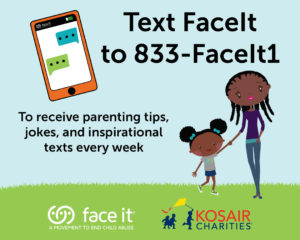
14 Nov The Face It® Movement Releases Ten Child Safety Tips for Caregivers During the Holiday Season
FOR IMMEDIATE RELEASE
Face It Contact:
Mara Powell
mpowell@kyyouth.org
502-895-8167*122
Kosair Charities Contact:
Lindsay Wehr
lwehr@kosair.org
502-637-7696
LOUISVILLE, KY (November 14, 2018) – The 2018 holiday season is coming up and, as families gather to celebrate and spend time together, Face It® is sharing tips for family, friends, neighbors, and the broader community to keep kids safe.
The holidays can be stressful for many reasons and everyone can play a role in keeping kids safe, including preventing abuse and avoiding unsafe situations that can result from excessive alcohol, overly stressed parents and caregivers, and children’s contact with extended family and friends.
“The holiday season often means more visits with family and friends, staying inside to avoid the colder temperatures, seemingly endless errands, and more quality time with your kids,” said Keith Inman, president of Kosair Charities®. “Face It’s safety tips and resources are an important reminder that keeping our kids safe really is up to all of us—parents, extended family and friends, faith communities, store clerks, and more. A little understanding and simple acts of kindness can go a long way.”
Here are ten helpful tips to share with friends and family about child safety.
- Holidays bring many gatherings that can be busy and full of familiar and new people. Ensure your child knows to be aware of anyone who asks them to keep a secret and knows the difference between “ok” and “not ok” touches, even when you trust the people they spend time with. Review the Body Safety 101 resource here.
- Talking to other adults about child abuse can be awkward, but it also helps build awareness and influence others’ choices about safety. When shopping or visiting with friends and family who are also parents, it’s reasonable to ask how they ensure their children are safe from harm when being cared for by other adults and talk about choosing safe caregivers.
- Meeting and greeting your neighbors and maintaining relationships with family and friends can ensure parents in your community don’t feel isolated and allow them an opportunity to ask for help when they need it.
- Offering to watch the children of your friends, family, and neighbors is so helpful when they need a break or seem frustrated. Holidays mean more errands and a child in tow on these errands can add additional stress to a situation, leaving a parent or caregiver vulnerable to reacting emotionally to frustrating child behaviors.
- When disciplining a child, remember that hitting and other kinds of physical punishment don’t work. Instead, use redirection, positive reinforcement, and time-outs to address inappropriate behaviors.
- Children learn good boundaries by watching the adults around them and figuring out what is comfortable for them. Ask a child if they want a hug and respect what the child says. Never force your child to hug or kiss a friend or relative if your child is reluctant.
- Remember, crying is normal for babies any time of year. If you feel frustrated with your child, it’s okay to leave the baby in a crib or safe place while you take some deep breaths and calm down.
- Teamwork is the gift that can help to renew patience. If you know another parent who may need a hand, offer to help and reduce that parent’s stress.
- The holidays can mean traveling, overnight stays, and interrupted schedules and for younger children, extra time spent explaining “what’s next” can help prevent tantrums.
- Parenting is hard, and sometimes friends and family members with good intentions can make it even harder. If a family member offers unsolicited advice or makes a negative comment, remember that you know what is best for your child. You can ignore the comment or ask that they withhold their advice.
“Many parents are told what not to do when it comes to parenting,” said Dr. Melissa Currie, MD, FAAP, the Professor and Medical Director and Chief of the Kosair Charities® Division of Pediatric Forensic Medicine at the University of Louisville. “The holidays are a great time to remind parents and caregivers the positive steps they can take, such as reading to their child, watching holiday shows together, or just taking the time to cuddle. These positive steps can help reduce negative behaviors and parental stress, and they help build memories that can last a lifetime. As for safety, following the tips above can go a long way to help protect our children from physical and sexual abuse. Child safety is an adult responsibility.”
To learn more about how you keep kids safe during the holiday season and beyond, visit the Face It® website: www.faceitabuse.org.
###
About Face It
The Face It® Movement launched in 2013 as an initiative led by Kosair Charities® in response to the number of child abuse deaths in the Commonwealth. Face It focuses on a three-pronged approach to addressing child abuse and neglect: promote best practices in child abuse prevention and intervention, build awareness and engage the community, and advocate for effective policies to improve the child welfare system. Learn more at faceitabuse.org. Follow us on Facebook and Twitter at @faceitabuse.




